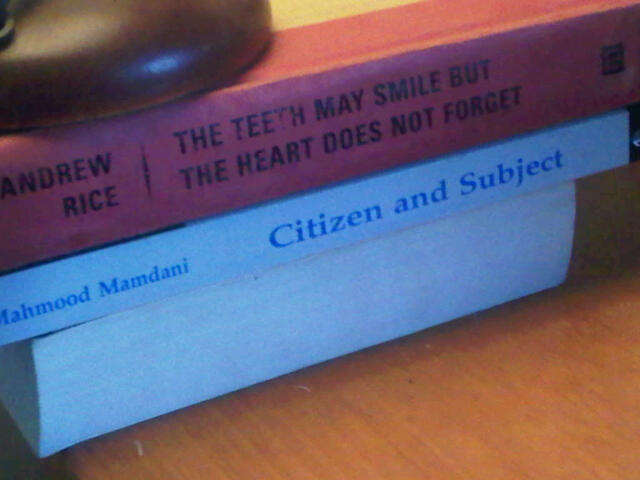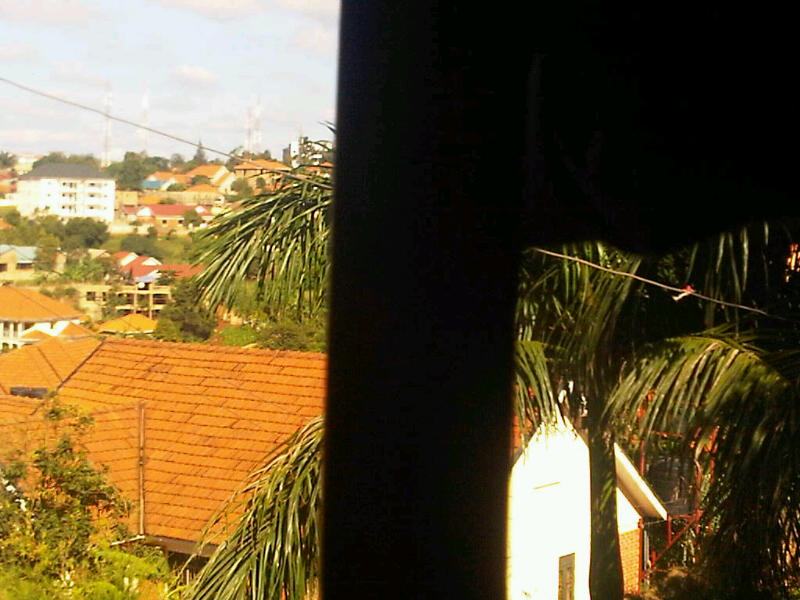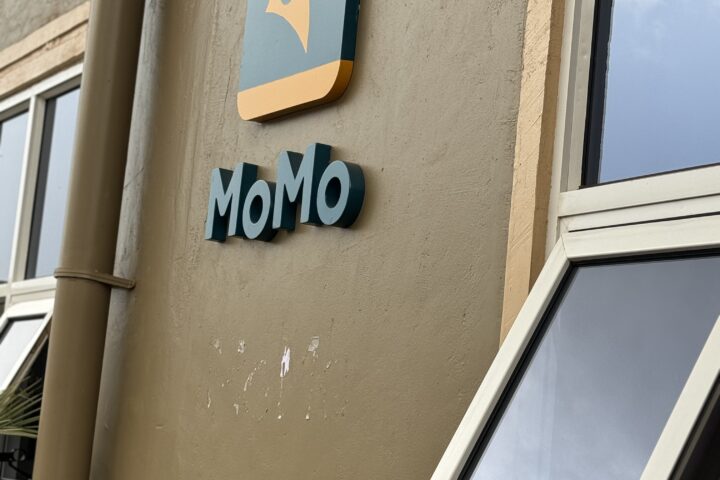Pssssst Our future will probably be determined by politicians but it would be wise to worry about what effect their politics would have.
Ha.
Kampala is soaking wet these days. The rain here falls as if it had an appointment to clean things up. Dust on the partly tarmacked roads swept away, down into drains filled with the plastic refuse that show the status of its inhabitants. Water bottles, “buveera” or polythene bags, maize cobs that won’t decay, bits of chewing gum and toothpaste bottles, occasionally a plastic baby’s shoe, usually in singular, and a body of someone with a story to tell we will never hear. Yesterday was no different.

The rain fell very hard on the high roof of a new mall I was working at. It is built in a wetland in Nalya, a sprawling residential area at the fading border between Kampala and Wakiso District. This area was once bush but the city, only found on seven hills once, is now everywhere.
( above a view from my window at the Kiwatule hill and books on my desk)
In the evening there was a report on the radio. The new Minister for the City Princess Kabakuma Matsiko and her sister the City Manager Jennifer Musisi launched a campaign to “keep the city clean”.
“ Its our city” Matsiko said while Musisi said we should castigate those who use the city as a toilet. If you see someone pissing by the road side or behind a paraffin pump at a petrol station called Mogass – like I was unfortunate to witness later that day, it is our responsibility to set them straight.
There is a Madi saying that a stream flows to its own path. There is a logic somewhere and where there is none- it cannot be denied that it has left gullies, valleys, beaten a path through rocks and widened the field of potatoes into a dirty pool that children delight in.
Kampala, now the city of the country that Lonely Planet named the leading destination for visitors must be flowing in some direction, its tiled roofs on the hills, iron sheets in the valleys, flush toilets elevated in the aristocratic center of Kololo while in Kamwokya, pits drain its filth into angry looking and smelly blue green drains whose dignity is covered by the remaining wetlands.
Some of my earliest memories of the city are of Kololo and Nakasero. These houses that dress these hills have changed hands many times. A group of politicians quietly parks their bags and say bye to their barking dogs as the curtain on their rule ends. In the 60’s, 70’s and 80’s, many who did not leave were found dead in the valley. Valley inhabitants in the sooty and boozy slums like Katanga often used these times to borrow a few things from the hills.
Oversize clothes and perfumes, fancy furniture on which to place saucepans or a chair large enough for the entire family of seven to fit. Lately the slums have grown very large and restless partly because since 1986, a government of military people who took residence in the seven hills – and many others since, has not budged.
I met Jaffer Amin ( one of Idi Amin’s younger sons) the other day at the National Theatre, a building besieged and bewildered by the change and the garbage, around it and he told me that Uganda’s Civil Aviation Authority was upgrading the old airport at Arua. That’s the biggest town in West Nile where Amin ( and incidentally I hail from though from the less controversial outpost of Moyo by the hills and mountains bordering South Sudan).
Development of the airport is a great thing for trade in that area has Uganda’s most established reputation for smuggling across the border.
Indeed Idi Amin (and another former resident of state house Nakasero) were accused of some smuggling operation involving gold rivets. He was army commander then in the swinging days after independence. The incident which led to a historic parliamentary debate over alleged corruption (much like we have seen lately involving the new occupants of the same hills) was seen by Milton Obote, Amins boss as an attempt at a parliamentary coup against him. Obote overthrew the constitution soon afterwards and was also overthrown by Amin.The whole incident is a curious throw forward to the other parliamentary coup that is shaking the National Resistance Movement these days, the political outfit that has ‘resisted” the casual coming and going of residents on the tiled roofs on the hills. I want to write of corruption as protest. The man pissing in the street because there are no toilets and the Minister being pissed on because he will not leave his big house.
Jaffer Amin said the problem with the sorting out of the old airport was that his father’s home is near the proposed new runways. So the aviation authorities would have to exhume the burial ground of the Amins.










